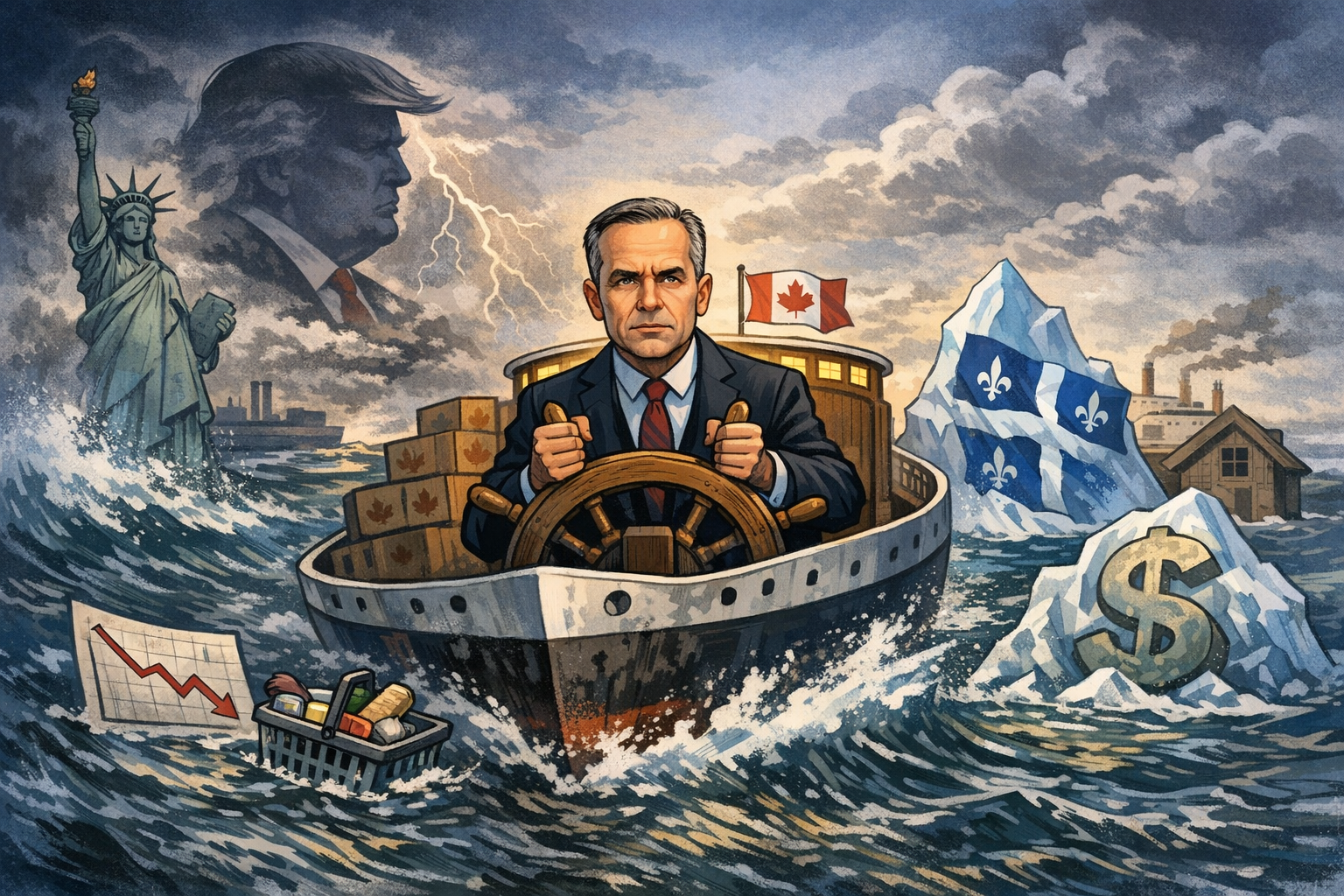Abacus Data Poll: Tight Race Continues as Trump’s Trade Talk Cancellation Adds Tension Ahead of Budget
November 2, 2025
Between October 24 and 29, 2025, Abacus Data surveyed 2,922 Canadian adults about the current political climate. The findings suggest a political environment that remains remarkably stable despite several flashpoints, including Donald Trump’s abrupt withdrawal from trade talks with Canada and Pierre Poilievre’s controversial remarks about the RCMP’s handling of Liberal-linked investigations.
With the federal budget set to be tabled on November 4, and the U.S.–Canada relationship under deeper strain, Canadians appear attentive, divided, and bracing for uncertainty, but not yet shifting decisively in any political direction.
Public Mood: Static and Stalled
A third of Canadians (33%) believe the country is headed in the right direction — essentially unchanged from two weeks ago. Meanwhile, 51% say Canada is off on the wrong track, reinforcing a broader narrative of unease without upheaval.
Confidence in global leadership remains deeply pessimistic: only 13% feel the world is headed in the right direction, and the same proportion (13%) say that about the U.S. under Trump’s administration.
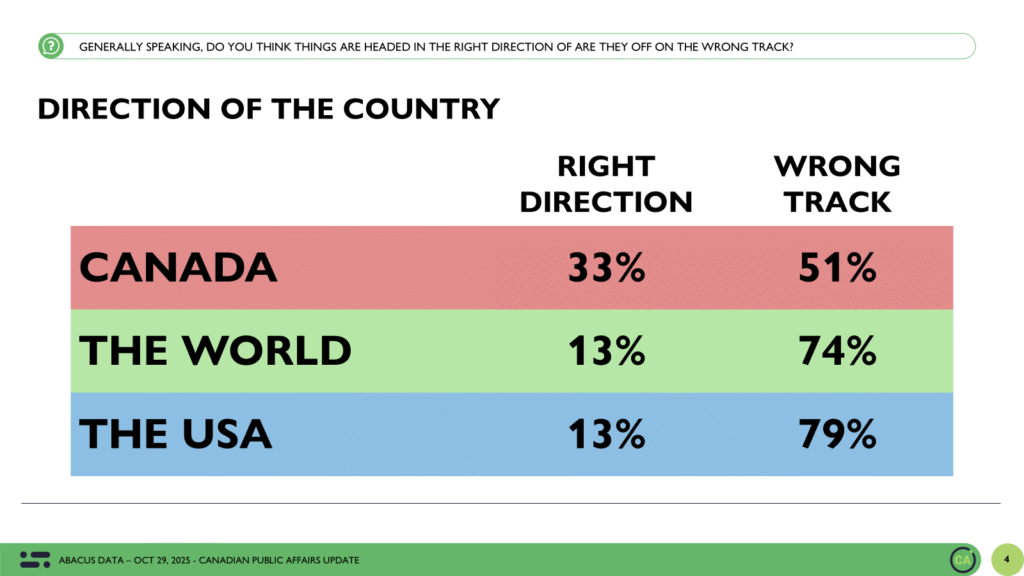
Trump, Ontario Ads, and the Fallout in Public Opinion
This wave captured public reaction in the immediate aftermath of U.S. President Donald Trump’s decision to suspend bilateral trade discussions. The move followed a U.S.-targeted advertising campaign launched by the Ontario government.
Trump’s visibility as a political concern has increased slightly: 37% of Canadians now cite Donald Trump and his administration as a top national issue, up two points from earlier this month. This makes Trump the second most frequently mentioned issue in the country — behind only the cost of living (62%, unchanged) and tied with the economy (37%).
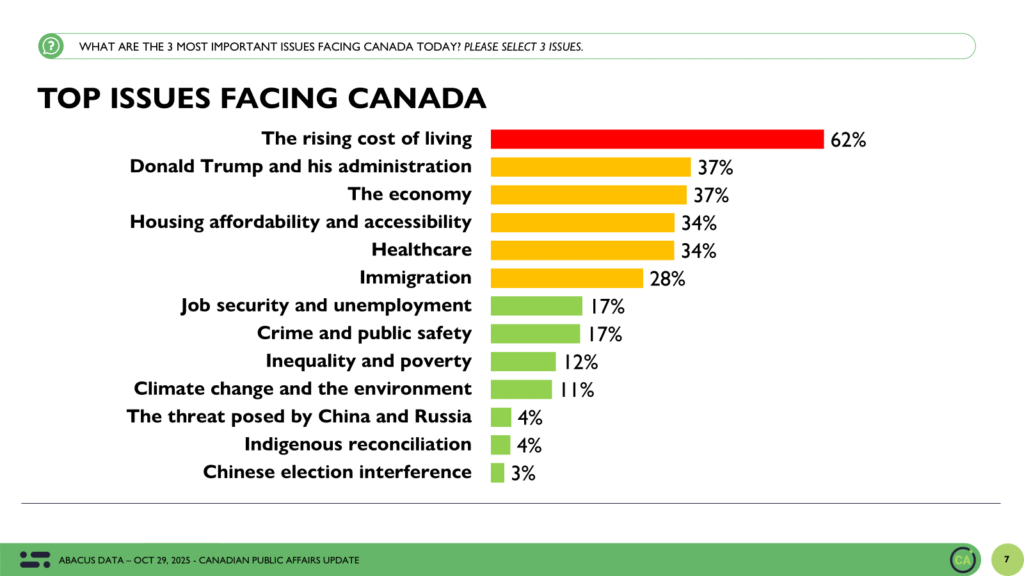
The increase is modest, but notable, reinforcing a trend: Trump’s presence in the news cycle correlates with shifts in public concern — especially among older, more risk-averse Canadians.
Still, Canadians remain overwhelmingly negative in their view of Trump: only 13% have a positive impression of him, while 74% view him negatively, for a net favourability of -61.
Government Approval: Softening Slightly, But Holding
Approval of the federal government led by Mark Carney sits at 47% — down one point since the last wave. Disapproval ticked up two points to 34%. That 13-point gap in net approval remains healthy, especially in such a competitive political environment, but the slight uptick in negativity reflects a delicate balancing act as the Liberals prepare to table their budget in a fraught economic and diplomatic moment.
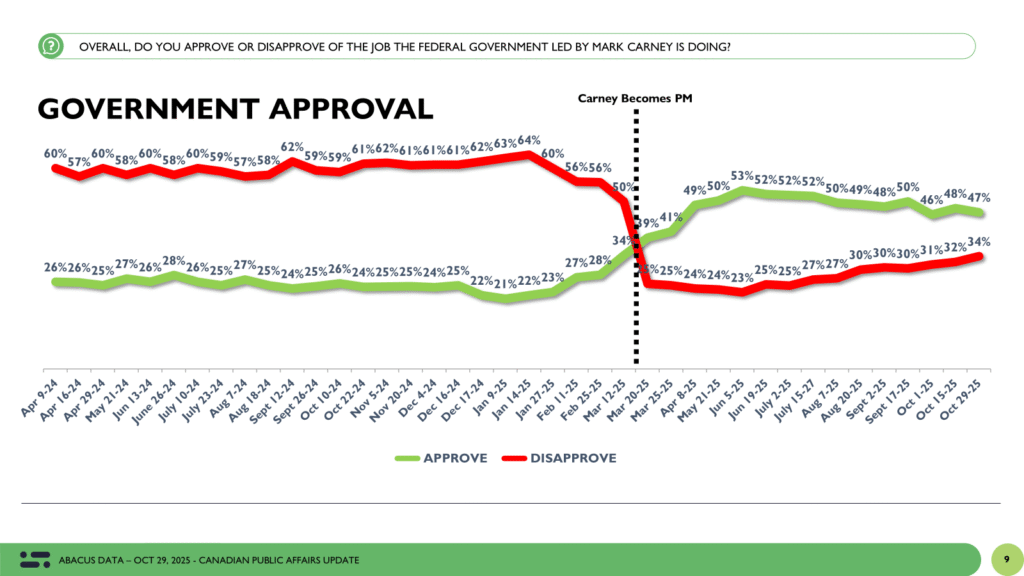
Leader Impressions: Carney Holds, Poilievre Stagnates
Mark Carney continues to lead in favourability: 46% of Canadians have a positive view of him, while 32% view him negatively resulting in a net favourability score of +14, unchanged since the previous wave.
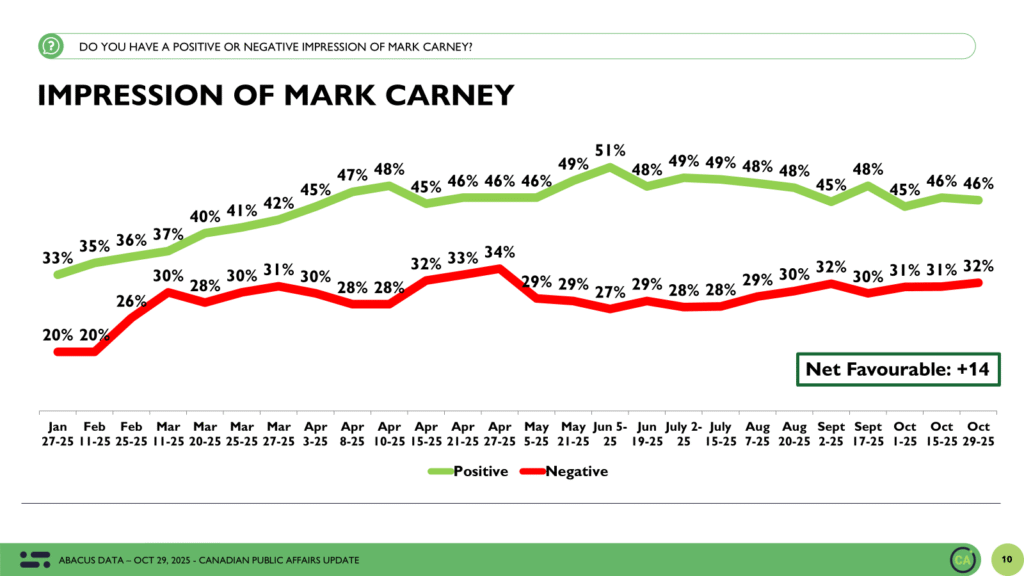
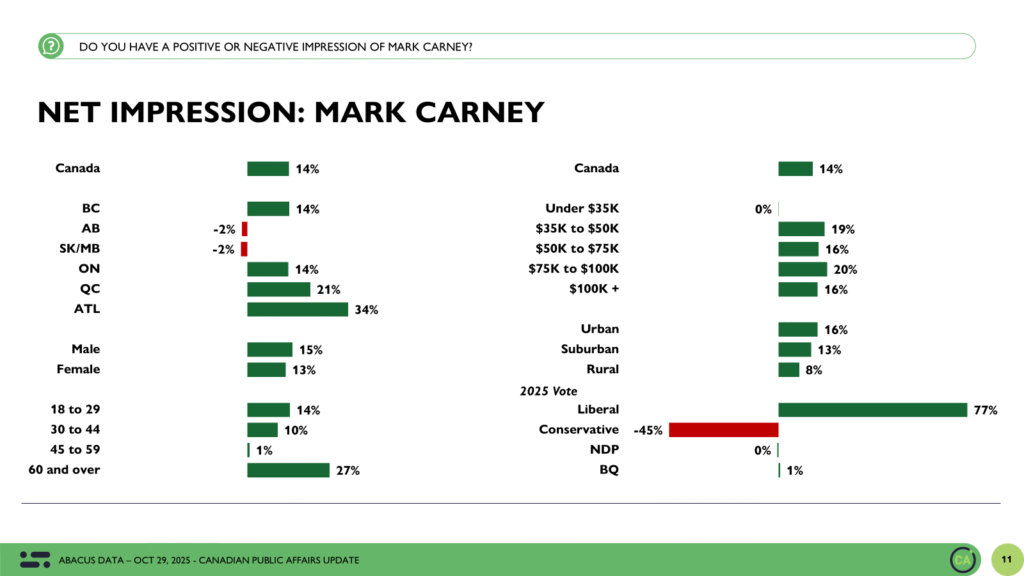
Pierre Poilievre remains less well-regarded overall: his favourables sit at 39%, while 42% view him negatively, for a net score of -3.
Poilievre’s recent interview, where he criticized the RCMP’s integrity in their handling of past Trudeau-related scandals, generated criticism from multiple corners. While the full electoral impact is unclear, his overall impression numbers have not changed, suggesting no obvious impact except reinforcing previously held impressions.
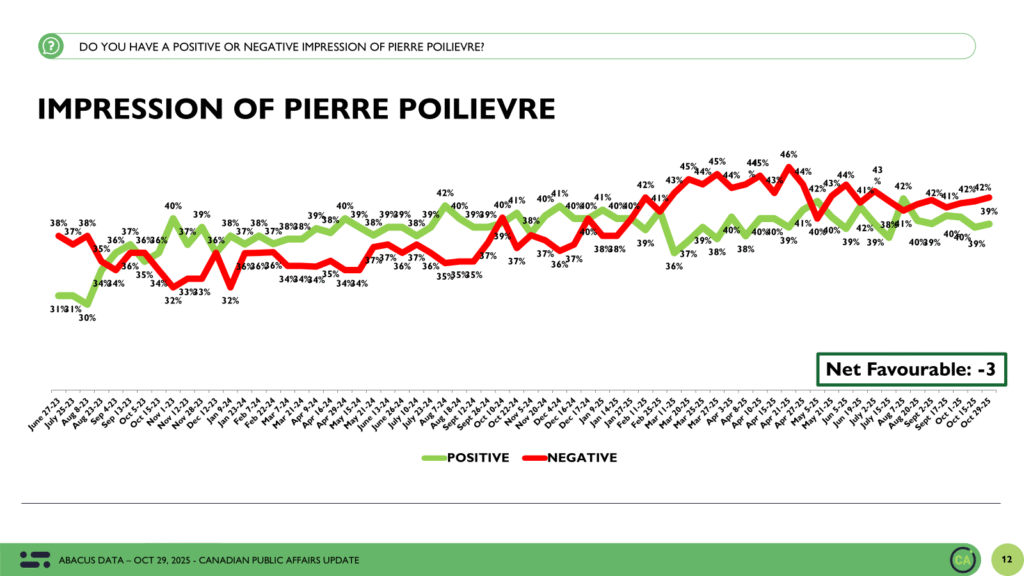
Vote Intention: Stability Reigns as Budget Looms
If an election were held today, the Conservatives would capture 42% of the vote (up one point), while the Liberals hold at 40%. The NDP sits at 8%, with the Bloc Québécois at 6% and the Greens at 3%. The People’s Party and other alternatives remain static at 1% each.
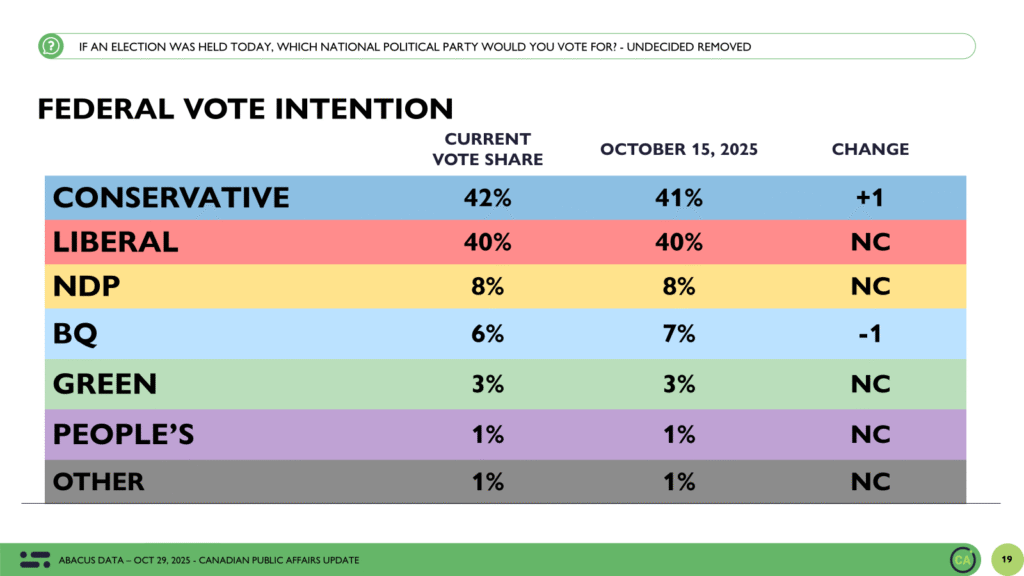
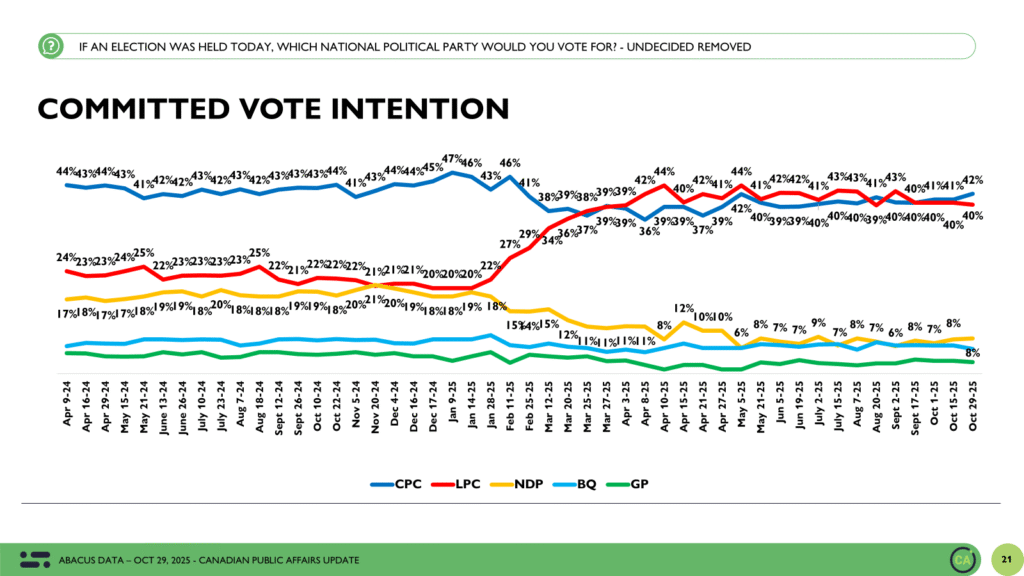
Regional Dynamics: Tight in Ontario, Dominant in Alberta
Ontario remains the focal point of the national contest: Conservatives and Liberals are locked in a statistical tie at 44% each. This mirrors the national picture and suggests a deadlock in the province where federal elections are often won or lost.
In Alberta, the Conservatives dominate with 62% to the Liberals’ 25%. In Quebec, the Liberals (40%) hold a notable lead over the Bloc (27%) and the Conservatives (25%). In British Columbia, the race is close: Conservatives at 41%, Liberals at 40%.
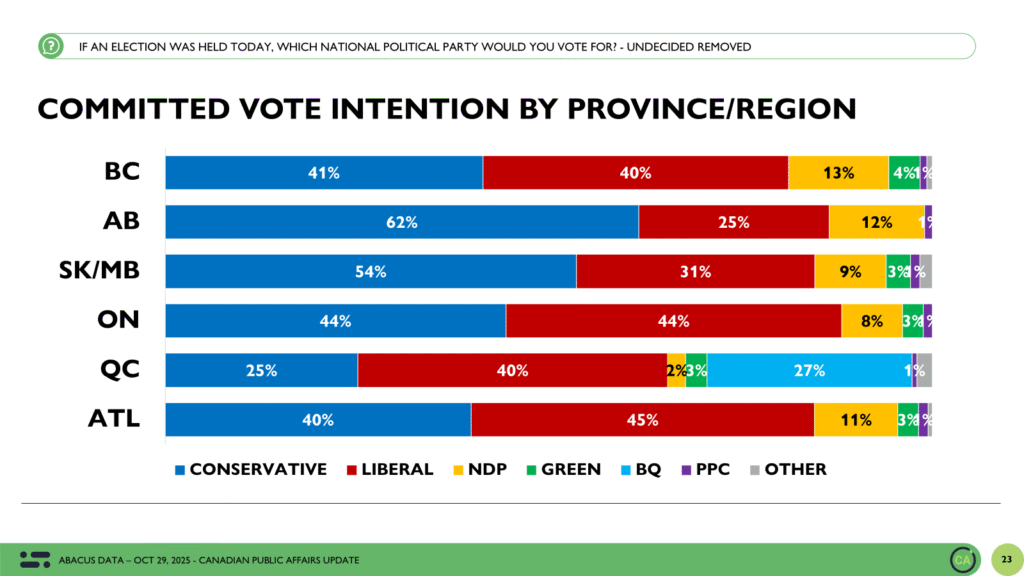
Generational Trends: Boomers Remain a Liberal Firewall
Among Canadians aged 60 and over, the Liberals lead by a significant margin: 49% compared to 37% for the Conservatives. This older cohort remains disproportionately concerned about Trump and disproportionately supportive of Carney’s steady leadership style. Every time Trump reinserts himself into Canadian public life, the Liberal lead among this cohort increases.
By contrast, the Conservatives lead among 30–59 year-olds, while younger Canadians (18–29) remain more divided, with neither party breaking away clearly in the data.
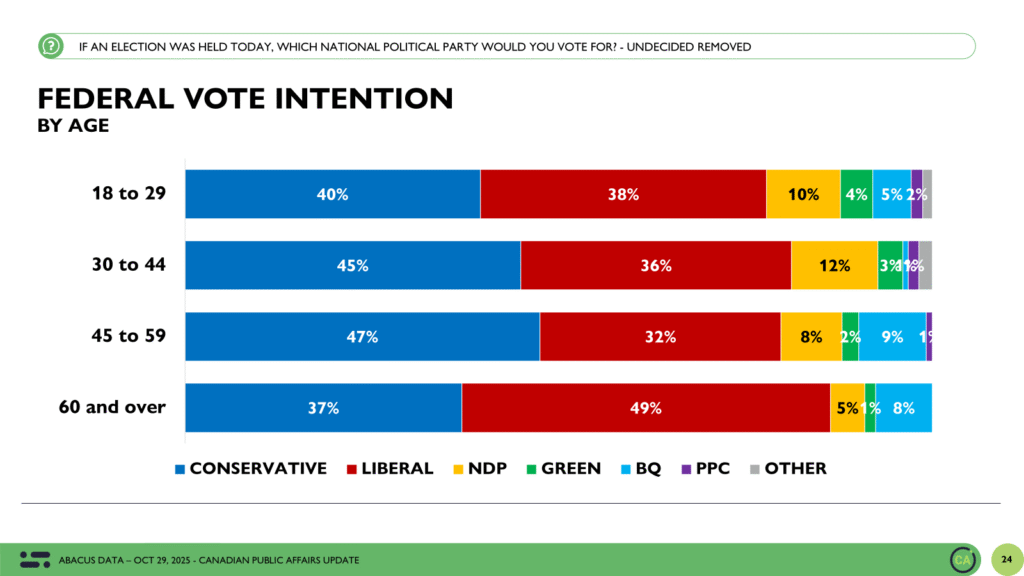

The Upshot
According to Abacus Data CEO David Coletto: “We continue to see remarkable stability in a highly competitive political environment. Despite headline moments — Trump’s trade walkout, Poilievre’s RCMP remarks, and the countdown to a major budget — Canadians appear to be observing more than reacting.
What stands out is how little advantage either party has gained from recent events. The Liberals retain their edge on international leadership and competence. The Conservatives continue to lead on cost-of-living, but haven’t expanded their appeal among swing segments, particularly older voters.
The big unknown is the budget. If it delivers reassurance without raising alarms, it could reinforce the Liberals’ case for steady management. But if it falters, the window opens wider for the Conservatives to present a contrast.
For now, the deadlock continues and a highly competitive political environment remains the norm.”

Methodology
The survey was conducted with 2,922 Canadians from October 24 to 29, 2025. A random sample of panelists were invited to complete the survey from a set of partner panels based on the Lucid exchange platform. These partners are typically double opt-in survey panels, blended to manage out potential skews in the data from a single source.
The margin of error for a comparable probability-based random sample of the same size is +/- 1.8%, 19 times out of 20.
The data were weighted according to census data to ensure that the sample matched Canada’s population according to age, gender, and region. Totals may not add up to 100 due to rounding.
Abacus Data follows the CRIC Public Opinion Research Standards and Disclosure Requirements that can be found here: https://canadianresearchinsightscouncil.ca/standards/
The survey was paid for by Abacus Data Inc.
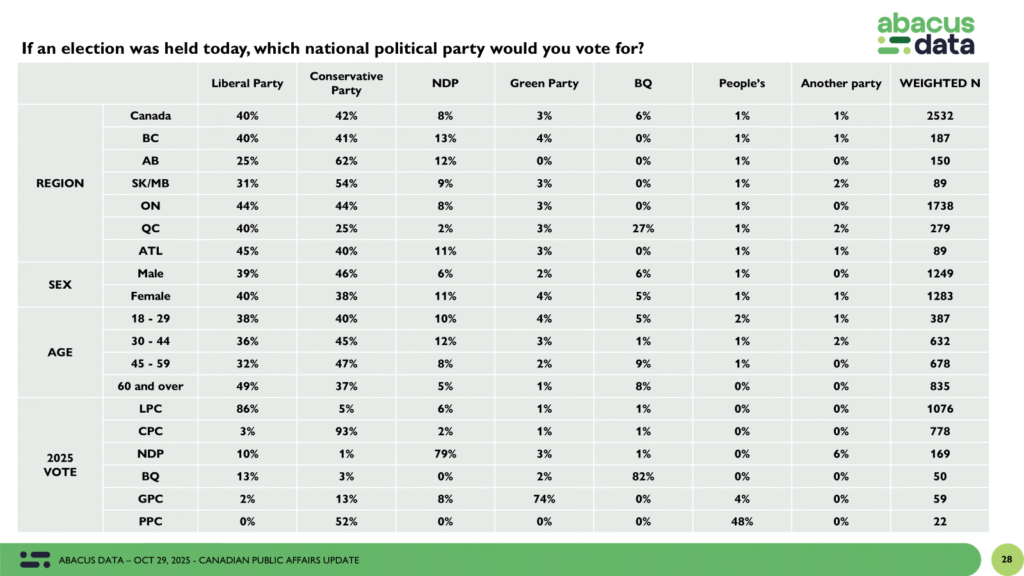
ABOUT ABACUS DATA
We are Canada’s most sought-after, influential, and impactful polling and market research firm. We are hired by many of North America’s most respected and influential brands and organizations.
We use the latest technology, sound science, and deep experience to generate top-flight research-based advice to our clients. We offer global research capacity with a strong focus on customer service, attention to detail, and exceptional value.
And we are growing throughout all parts of Canada and the United States and have capacity for new clients who want high quality research insights with enlightened hospitality.
Our record speaks for itself: we were one of the most accurate pollsters conducting research during the 2025 Canadian election following up on our outstanding record in the 2021, 2019, 2015, and 2011 federal elections.
Contact us with any questions.
Find out more about how we can help your organization by downloading our corporate profile and service offering.



